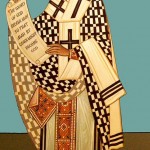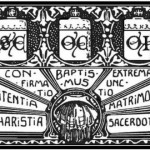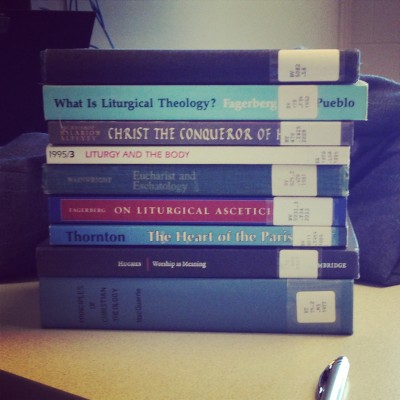If you’re new to my Sermon Notes, you can read about why I prepare them here. They aren’t just for preachers, they’re for everyone!
Thesis
As we prepare for the gift of the Holy Spirit and the birth of the church at Pentecost, we turn our attention to Jesus’ high priestly prayer and an examination of what it means to testify to the truth. To truly follow Jesus is to proclaim in word in deed that he is the Risen and Ascended One. His ascension means that he is reigning over all of creation, a fact made possible by the resurrection to which we bear witness.
Analysis
Collect
O God, the King of glory, you have exalted your only Son Jesus Christ with great triumph to your kingdom in heaven: Do not leave us comfortless, but send us your Holy Spirit to strengthen us, and exalt us to that place where our Savior Christ has gone before; who lives and reigns with you and the Holy Spirit, one God, in glory everlasting. Amen.
Two facts place this Sunday in a particular context: first, this is the last Sunday of Eastertide and therefore the last Sunday before Pentecost. Second, the seventh Sunday of Easter falls in between Pentecost and the Ascension. Jesus is ascended but the Spirit is not yet sent. The Collect does a fabulous job of helping the gathered people to enter into that “in between” time/space the disciples occupied.
Three main things from the Collect:
- Jesus has been exalted. If “God was glorified in Christ crucified” then Jesus is exalted in the ascension. My seminary professor would often quip, “Don’t forget about the ascension, we need to get Jesus ascended so he can reign over all things.” The ascension is part of—and only makes sense in—the Incarnation-Crucifixion-Resurrection-Ascension continuum. Jesus ascends in “great triumph” because he has “trampled down death by death” and has “harrowed hell.” The Father exalts Christus Victor to his right hand.
- Plea for the Holy Spirit. “Do not leave us comfortless” is a reference to John 14-17 where Jesus promised to not leave his children as orphans but that he’d send them the Spirit to lead and guide them into all truth. We are blatantly aware that we cannot operate on our own accord or under our own strength. We require the active ministry of the Holy Spirit to bring us both comfort and strength.
- Exalt us too.Athanasius wrote, “The Son of God became man that we might become God.” N. T. Wright has suggested that the creation mandate for Adam and Eve to reign and rule with the LORD is still the call for citizens of God’s already-come-but-still-coming Kingdom. We will reign with Christ our elder brother, the firstborn, the author and perfector of our salvation. The prayer for exaltation is a prayer to be with Lord where he is (at the right hand of the Father) and to begin living out our inherited birthright.
The whole Collect speaks in an eschatological tone: Christ will come again. We await his coming in glory. There needs to be a shift in our thinking as we close Eastertide and move toward Ordinary Time: how do we inhabit and occupy the already but not yet? Perhaps this Collect can become a daily prayer for you and/or your church.
First Lesson – Acts 1:15-17, 21-26
Finally our Eastertide romp through the book of Acts takes us to a lesson that makes sense chronologically. Acts 1:1-14 remembers the Ascension of the Lord and is part of the lectionary for the Feast of the Ascension. Acts 1:15-26 depicts that length of time (10 days) between Ascension and Pentecost. This is where we find ourselves on the Seventh Sunday of Easter.
“In those days”—those days being the days after the Lord’s exaltation and before Pentecost—Peter stands up and speaks to a large crowd. The crowd is over 120 people and we learn from this passage that Jesus’ following was much larger than the 12 disciples. The two who traveled the road to Emmaus were companions of Jesus and clearly there were well over 100 others who were committed to Jesus and his teachings even if they weren’t apostles.
Peter begins his message by affirming the Scriptures and their fulfillment in Jesus and in Judas. Unfortunately the RCL cuts out verses 18-20 which add important detail to Peter’s message and the following actions. Peter points out that Judas’ actions were foretold by “the Holy Spirit through David,” he then goes on to quote another Psalm suggesting that they elect someone to take Judas’ place as an “overseer.”
The main qualification for someone to take Judas’ place is that he be someone who had been in and among the followers of Jesus from the beginning [of Jesus’ ministry]. The entirety of Jesus’ ministry spans from his baptism in the Jordan by John up to his resurrection. Why is this the case? Because the individual chosen needs to be a “witness of the resurrection.” The Christian faith is a resurrection faith: Paul writes in 1 Corinthians 15 about the futility of our faith without the resurrection, Pope John Paul II referred to us as “the Easter people, and hallelujah is our song”, the centrality of the resurrection is overwhelming in the book of Acts and the epistles. The one who is to take Judas’ spot needs to have been with the company from the beginning in order to witness to the resurrection.
Matthias is chosen and the process is simple: prayer. No politics, no back door deals, and no “watch-the-left-hand-so-you-can’t-see-what-the-right-hand-is-doing” type business. Perhaps the church can move further away from post-Enlightenment democratic ideals and embrace the rule of prayer trusting the Holy Spirit to lead, guide and direct.
Psalm 1
Psalm 1 sets the stage for the entire collection of Psalms. It is considered by many scholars (Goldingay, Brueggemann, etc.) to depict two alternative ways of living: the way of righteousness and the way of wickedness. On account of this psalm being the first in the book, everything after it points back to the apparent choice one can make: righteousness or wickedness, life or death.
For to live is to be planted near a stream. It is to stay away from the wicked and their actions. It is to delight in the law of the LORD and it is to bear fruit. The way of the wicked is different, for the way of the wicked is like chaff in the wind. It is to not stand upright amongst the righteous. It is to be doomed by the LORD. Two VERY different pictures and that’s the choice. It’s the choice Joshua provided Israel in Joshua 24:15, “Chose this day whom you’re going to serve, but as for me and my house we will serve the LORD.”
The choice is there, ever-present among each individual: to whom or what will you devote your life? Whom shall you love and desire more than anything else? Will you be righteous or wicked? The book of Psalms spends significant amounts of time talking about the lives of the righteous and the lives of the wicked. Often it seems that the wicked are “winning” because their actions go unpunished and are seemingly prosperous. Sometimes we might feel discouraged or even angry at God for letting those who have wronged us do so well. Take hope friend, the battle is not yours and neither is the last word. God will deal righteously with all people and our call is simply to abide, to obey and to delight in his law.
Use this time to talk about the different ways and reasons that Psalm 1 sets the table for the other 149 psalms and invite your church to journey through the psalter together knowing it to be good, useful, inspired, and part of Israel’s corporate prayer book.
Epistle – 1 John 5:9-13
The testimony of God is that he has testified to his Son by giving us eternal life through his Son. The entire focus of John’s first letter has been making the name of the Son of God known to his readers that they/we might believe in him.
This passage is fairly straightforward; I am more interested in it’s connection to Psalm 1 and Acts 1 in this liturgical setting.
What does it look like for us to testify?
What does it look like for us as a church to choose the way of life and righteousness?
In Acts 1, Peter was testifying to the Truth by explaining how the Scriptures were fulfilled in Jesus and through Judas. The gathered company was tasked to appoint someone to take over for Judas and the given criterion was simple: he needed to have been there from the beginning so he could witness to the resurrection. Our journey through Acts during Eastertide has focused on stories in which Peter and Philip have witnessed to the Good News of Jesus. To be his disciples is to be his witnesses.
We also testify to the Truth through the totality of our lives and being, this is the connection point with Psalm 1. It is no small task to choose between life and death, and it shouldn’t be done flippantly. The picture of the righteous person in Psalm 1 is a picture of someone rooted, established, and planted firmly next to the stream [of life]. This individual does not participate in the sinful ways of the wicked because he/she is connected to the One who is true Life. The disciple bears fruit and prospers not because of her own strength but because she is planted in the right place: next to the stream. We bear witness to the Son of God when we live Spirit-filled and –enabled lives proclaiming the resurrection in word and deed.
Gospel – John 17:6-19
The end has drawn nigh. Jesus and his disciples are about to travel to the Garden of Gethsemane where he will be arrested. To bring his Upper Room Discourse to a conclusion, John record’s Jesus as praying a beautiful, high priestly prayer. The content of Jesus’ prayer in John 17 is his disciples.
I think that this passage is a good candidate for moving slowly through it verse by verse. Unpack the various portions of our Lord’s prayer and help teach toward application and further meaning. Jesus prays for:
- Jesus made the Father’s name known
- The Father gave “them” to the Son
- The know everything and believe
- Mine are yours and yours are mine – I’m glorified in them
- They are in the world
- Protect them that they may be one as we are one
- They do not belong to the world, “I am not asking you to take them out of the world.”
- Sanctify them
- I have sent them
That’s a lot to unpack—let me try to do it in a few sentences per point…
Jesus made the Father’s name known. John’s gospel is very intentional in showing Jesus as one constantly pointing to the Father: the words spoken at his baptism, his prayers lifted to the Father, and his insistence that he is doing his Father’s work. To follow Jesus is to belong to the Father. Are we making the Father’s name known in the world?
The Father gave them to the Son. The “them” is the disciples but this point goes deeper for me. I think of the psalmist who says that “the LORD has the cattle on a thousand hills” or that “the earth is the LORD’s and all that is in it.” Our God is a God of abundance (not scarcity) and he has lovingly invited others to participate in his work. All belongs to the Father—but we are being good stewards of all He’s given?
They know everything and believe. Jesus already told his disciples that he now viewed them as friends rather than servants and has invited them into the mystery of who he is and what he is doing. Great responsibility comes with knowledge and the call to believe once we know is strong. Through the words of Scripture you’ve been invited to participate in God’s Kingdom through his revelation—do you know and believe?
Mine are yours and yours are mine—I am glorified in them. Jesus’ ministry is that of the Father and they share in that ministry together. Just as God is glorified in Christ crucified, so too is Jesus glorified in the discipleship and obedience of the disciples. Do you share your ministry with others? Do you invite others to participate as co-laborers or do you treat them as servants? These are questions for vocational ministers and all disciples.
They are in the world. We are called to minister in the world(s) we inhabit. Jesus may not have been “from” this world but he is utterly “for” this world and calls his disciples to the same kind of life. What is the world you inhabit?
Protect them that they may be one as we are one. The High Priestly Prayer is a prayer for unity among God’s people. It is a unity stemming from the perichoresis and koinonia of the Trinity and it is a unity that we are called to strive toward now, in the present. That unity needs to be protected by the Father to the glory of the Son through the Spirit. As we move closer to Pentecost and the birth of the church we need to cherish the fact that there is one holy catholic and apostolic church.
They do not belong to the world, “I am not asking you to take them out of the world.” For me this is the crux of the prayer and the entire lectionary for this Sunday. Jesus makes it abundantly clear that he is not removing us from our current situations nor is he doing away with this world. There needs to be a shift in our mindset, worldview and social imaginary: we do not belong to the world. Those in Christ belong to him and are not owned by the devil, the flesh, the sin or the world. Incarnational ministry celebrates the goodness of God’s creation and the call to join Jesus in his redemption of all things. Are you joining Jesus in that work? What would it look like for you to belong to Jesus rather than the world? It would mean that we love differently, that we lead differently, that we tell time differently, and that we live lives of oblation, self-offering, praise and thanksgiving before the triune God.
Sanctify them. In order to be in the world but not of the world we need to be sanctified, that is set apart for holy and noble purposes. That is the point of Pentecost. That is the point of baptism, confirmation and ordination. That is the point of the Christian life. So, for what have you been set apart? Pray that the Lord would make you a holy instrument for a noble purpose.
I have sent them. The Christian life is the apostolic life: we are sent out in the world to which we no longer belong that we might proclaim God’s truth and witness to the resurrection. To whom are you sent?
Liturgical Considerations
Don’t forget about the ascension! Get Jesus ascended! Whereas many Catholic, Anglican and Orthodox churches will be celebrating the Feast of the Ascension on May 14, this may not be the regular practice of your church. And that’s ok. If putting together a service and liturgy for the actual day is not possible consider making some minor changes to your worship on the Seventh Sunday of Easter. Here are some options:
- Consider beginning the reading from Acts 1 with the first verse of the chapter in order to tell the story of the ascension.
- Incorporate one of these two collects into your worship:
Almighty God, whose blessed Son our Savior Jesus Christ ascended far above all heavens that he might fill all things: Mercifully give us faith to perceive that, according to his promise, he abides with his Church on earth, even to the end of the ages; through Jesus Christ our Lord, who lives and reigns with you and the Holy Spirit, one God, in glory everlasting. Amen.
Or this
Grant, we pray, Almighty God, that as we believe your only-begotten Son our Lord Jesus Christ to have ascended into heaven, so we may also in heart and mind there ascend, and with him continually dwell; who lives and reigns with you and the Holy Spirit, one God, for ever and ever. Amen.
- Include a Proper Preface to the Eucharist or an opening to the Prayers of the People that speaks to the significance of the Ascension. Here is an example that I’ve penned:
- Almighty God, we praise you for the exaltation of your Son our Savior Jesus Christ to your right hand. Through his Incarnation, earthly ministry, crucifixion and resurrection he has conquered sin, evil and death and by his glorious ascension he is triumphantly reigning over all of creation. Grant us the ability and desire to follow our Sovereign King that one day we may be exalted to where he is: living and reigning with you and the Holy Spirit, now and forever. Amen.
- Always, always refer to the Incarnation, Crucifixion, Resurrection and Ascension in the same breath
- Consider using the term “exaltation” instead of “ascension” during your sermon to convey more powerfully what took place
Synthesis
Get Jesus ascended!
Help your people occupy the space between the ascension and Pentecost.
Point to Jesus as Jesus pointed to the Father.
Go back to my points on the Gospel lesson and use those as your “So what?” and as my synthesis. That’s what it means to be sent, to testify, to witness and to live as if Jesus has been exalted and is reigning over all.












